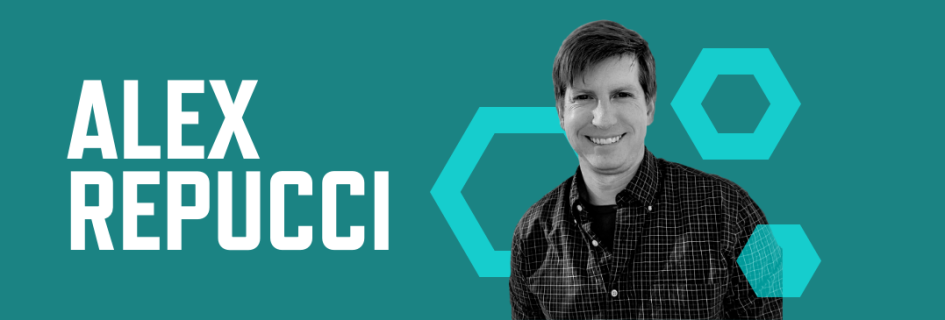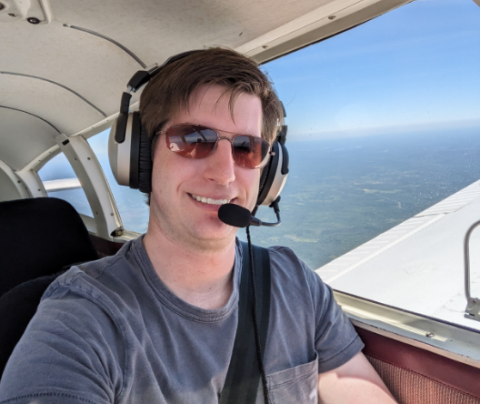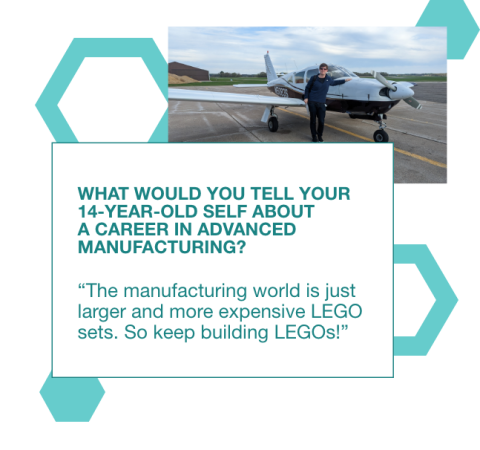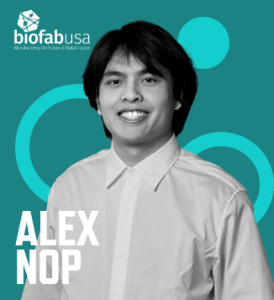
Chemical processing expert, industry collaborator, amateur airplane pilot
Alex Repucci says he is frequently reminded that the best solution does not need to be the newest, shiniest technology on the market. It’s the innovative ways that you can use the resources you already have.
Alex is an experienced chemical engineer working in the specialty chemicals industry. He is 3M’s member representative to the RAPID institute, which is devoted to revamping the ways industry refines chemicals to use less energy, reduce emissions, reduce waste, and make the process safer. In his work with RAPID, Alex has shown a high level of leadership and engagement in solving manufacturing challenges.
He is skilled in chemical process design, from front-end modeling through detail design and commissioning. He is especially skilled in the transition production from batch operations to fully continuous processing. Most industrial chemical processes require batch production, which is often much more expensive than continuous processing as it includes starts and stops, heating and cooling of materials, and the purging of excess chemicals, gasses, or byproducts.
Alex has two primary roles in his job as Manufacturing Technology Specialist for 3M. He is responsible for scouting and implementing new process technologies in 3M’s chemical plants to improve safety, efficiency, and cost. He also works with 3M’s corporate sustainability team to develop a technology roadmap for reaching the company’s long-term decarbonization goals. For a career focused on advancing American manufacturing in sustainable ways, Alex Repucci is a Modern Maker.
Q&A with Alex
How did you find your way to working in advanced manufacturing?
I was very interested in chemistry from an early age. I remember spending hours looking at a periodic table and thinking about the concept of how everything could be broken down into the elements. In high school, my chemistry teacher was a former engineer at Procter & Gamble, and she explained what chemical engineering was. I was able to connect my interests in chemistry to my passions for problem-solving and majored in chemical engineering in college. When I got to 3M, I started off by managing projects at the chemical plants and grew a foundation in chemical process engineering and design. I eventually took on my current manufacturing technology position, further specializing in cutting-edge advanced manufacturing processes.


What is the most challenging part of your job?
The hardest part of my role often is properly evaluating a technology for economic viability and then socializing it with management. At a certain, point you are responsible for convincing others that an investment is worthwhile, and a lot of your reputation can be on the line, so you need to make sure you’ve done a thorough job of evaluating it.
What is the best part of your job?
My favorite part of my job is seeing a new technology solution fully realized into a manufacturing setting. Often it takes years for a new technology to be scaled up and installed in a factory, but it’s always extremely rewarding to see. I also love the interactions I have along the way with others who are excited about bringing new ideas to reality, both inside and outside of 3M.
What would people be surprised to learn about manufacturing or your role in it?
Often the best solution in manufacturing is not the newest, shiniest technology on the market. It’s the innovative ways that you can use the equipment that you already have.
What advice do you have for someone new to the industry?
You will never feel fully comfortable in your own understanding. Embrace that, ask questions, demonstrate enthusiasm, and pursue your own ideas. Even if most of your ideas don’t work out (I know mine haven’t), you will still gain valuable understanding and make new connections along the way.
What makes you excited to go to work?
I love that by working for a large manufacturing company, my efforts to promote sustainable design practices are amplified beyond what a typical individual might be able to achieve. I am also very lucky to be surrounded by enthusiastic people who are also trying to make a difference.
If you didn’t have to work, how would you spend your day?

I’d fly somewhere fun in my small plane. Maybe I would visit a new city or find a remote spot to go camping.
What activity gives you the most energy?
I love visualizing the path toward achieving net-zero emissions and the types of technologies and projects that it will take to get there.
What hobbies make you better at your career?
Learning and becoming proficient at flying a small airplane is a great way to increase your mental acuity. There’s so much to learn, and you always must be on your game when it’s just you up in the air.
How does the work you do impact the world?
3M and companies like it currently emit 1.5 million tons of CO2 every year through manufacturing operations. I would like the work I am doing to drop that number to zero by the time I retire (which coincides with 3M’s 2050 net-zero target). It’s energizing to have a long-term goal that I can structure my career around, and I know that what I’m doing will have an impact even far beyond 3M




